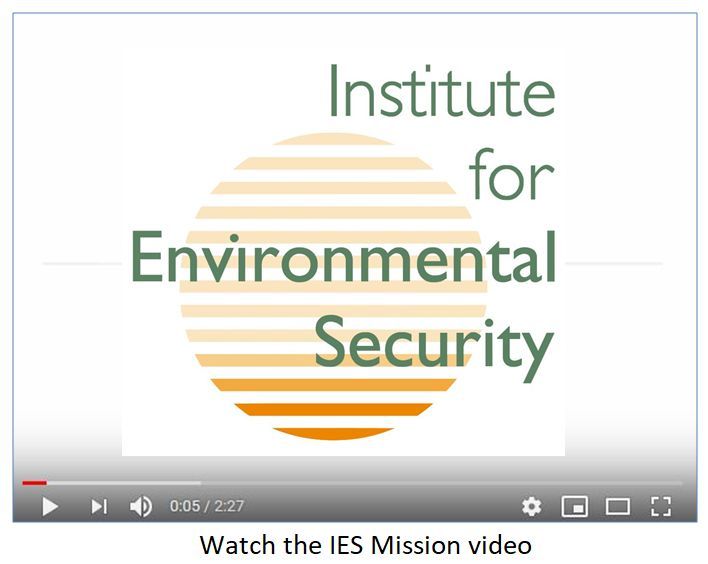What we do

The Institute for Environmental Security (IES) is an international non-profit non-governmental organisation established in 2002 in The Hague, in order to increase political attention to environmental security as a means to help safeguard essential conditions for peace and sustainable development.
The Institute's mission is: "To advance global environmental security by promoting the maintenance of the regenerative capacity of life-supporting eco-systems."
IES was established through the collaborative efforts of:
- The Netherlands Committee for the IUCN,
- Stichting Environment & Development Resource Centre,
- Stichting EuroCampus Institute, and
- TransGlobal Ventures, Inc.
Programme Areas and Objectives:
Our multidisciplinary approach integrates the fields of science, diplomacy, law, finance and education with the following key objectives and activities:
Science: Create enhanced decision tools for foreign policy makers, donors and their target groups on regional, national and local levels through:
- Mapping and integrating environmental security challenges into foreign policy,
- Publishing and disseminating multidisciplinary research-based policy options and educational materials,
- Stimulating the emergence of eco-regional networks and partnerships, and
- Providing expert briefings for decision makers.
Diplomacy: Promote effective linkages between environment, security and sustainable development policies through:
- Monitoring and reporting on relevant governmental and international sustainable development strategies,
- Collecting and sharing information on relevant research and NGO activities,
- Promoting networking partnerships and campaigning for Environmental Security, and
- Facilitating informed dialogue between experts and policy officials.
Law: Contribute to the development of a more effective system of international law and governance through:
- Promoting consistency among and between MEAs and agreements on investment and trade,
- Fostering recognition of the rights and responsibilities of both state and non-state actors,
- Strengthening environmental dispute resolution, and
- Formulating policy models and options for global environmental governance.
Finance: Introduce new and innovative financial mechanisms for the maintenance of the globe's life supporting ecosystems through:
- Developing replicable payment and incentive systems for the sustainable delivery of environmental goods and services,
- Stimulating market and/or treaty based investment programmes, including public-private partnerships,
- Assessing the feasibility, over time, to set up a global clearing house for the payment of environmental goods and services, and
- Promoting eco-regional approaches as essential building blocks for the traditional world economy on the basis of targeted research involving quantitative economic models, case studies on particular eco-regions, and best practices.
Education: Build the environmental knowledge capital of people and organisations through:
- Providing web-based knowledge resources on environmental security,
- Deploying e-communications, e-leaning and e-collaboration tools for raising public awareness,
- Promoting leadership in sustainable development through education and training, and
- Enabling the assessment and certification of environmental knowledge capital.
Context:
Our mission and programme should be seen in the context of promoting international sustainable development goals and as a contribution toward long-term poverty alleviation as advocated in:
- Agenda 21,
- UN Framework Convention on Climate Change and Kyoto Protocol,
- Millennium Development Goals,
- Monterrey Summit on Financing for Development Summit,
- Doha Development Agenda,
- Sustainable Development Goals, and
- Paris Climate Agreement
Affiliations:
- IES is a partner in The Hague Roundtable on Climate & Security
- IES is a participating organisation in the Brussels Dialogue on Climate Diplomacy
- IES is an institutional member of the Global Military Advisory Council on Climate Change
